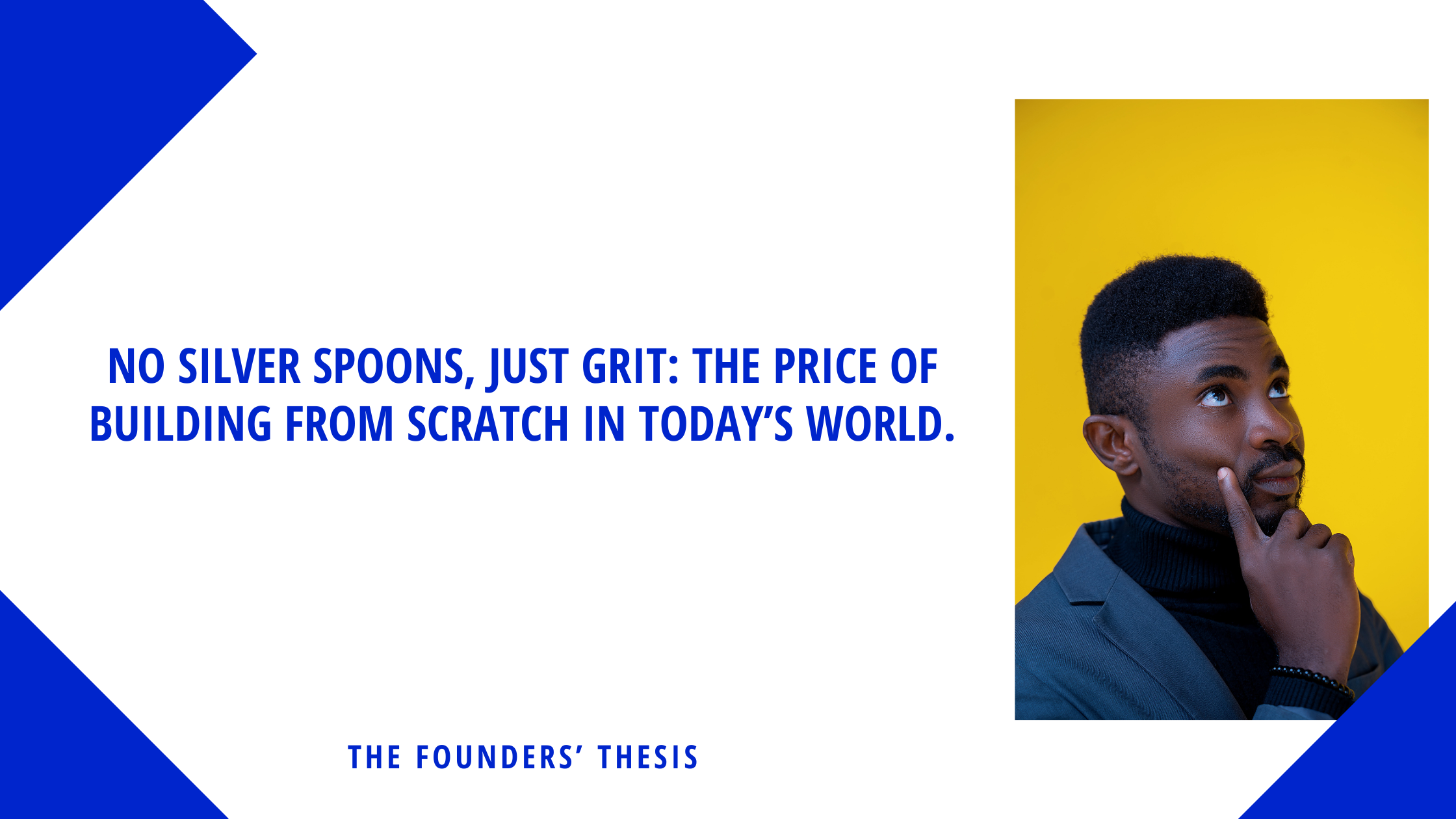“Many of us (myself included) are still building a rock-solid life. No inherited silver spoons. Just pure grit.” – Oluwatosin Oguntunde.
In a world that appears increasingly polarized between the haves and the have-nots, this sentiment captures the inner dialogue of millions across the globe — particularly in developing economies, but not exclusively so. Building from scratch, with no legacy wealth, connections, or safety nets, has become both the struggle and badge of honor for the self-made generation.
The Wealth Gap: A Starting Line for Some, a Steep Climb for Others
Let’s be honest — privilege is real. According to the World Inequality Report (2022), the top 10% of earners globally take home 52% of global income, while the bottom half earn just 8.5%. More alarmingly, the richest 1% own 38% of all global wealth — a clear indicator that many were born not just with silver spoons, but with full silver dining sets.
In the U.S., a study by the Brookings Institution found that 50-60% of wealth is inherited, not earned. Inherited wealth gives some a massive head start — be it in education, housing, entrepreneurship, or access to influential networks.
Meanwhile, for millions — especially in countries like Nigeria, India, or Brazil — economic survival is a hustle, and upward mobility is slow and often stifled by systemic barriers.
Building with Grit: The Reality of the Self-Made
For the rest of us who didn’t inherit fortunes, the game looks different.
- According to OECD, over 56% of youth in developing countries face underemployment or work in the informal sector — often earning below living wages.
- In Nigeria, NBS data (2023) reveals that over 63% of youth are either unemployed or underemployed, navigating a volatile job market with few support systems.
- Globally, 40% of entrepreneurs start with less than $5,000, relying on personal savings, loans, or crowdfunding (Guidant Financial, 2024).
This proves that for many, there is no shortcut — just sweat equity.
But here’s the twist: history shows that grit can build empires. From Howard Schultz (who grew up in public housing and built Starbucks) to Elon Musk (who lived off $1/day meals while coding), stories of people who clawed their way up the socioeconomic ladder are living proof of what resilience can yield.
The Cost of Laying the Groundwork
Here’s where most people miss the mark: behind every visible “overnight success” lies years of invisible sacrifice.
- 80% of startup founders work over 60 hours per week, often with no pay for the first year (Forbes, 2023).
- In sub-Saharan Africa, self-employed individuals often work 20% more hours weekly than salaried workers — yet earn significantly less (ILO Report, 2022).
- Many delay family planning, postpone home ownership, and live in financial precarity for years while building their dream.
And yet, this foundation-laying season rarely gets the respect it deserves.
“Yes, some people are privileged — they’ve got access, support, and steady funding. But never forget: someone paid the price, laid the groundwork, and built what others now leverage.”
Exactly. Many of the platforms others stand on today were constructed through blood, sweat, and tears by visionaries, immigrants, parents, and pioneers who sacrificed comfort for the sake of legacy. Even those who inherit wealth are only beneficiaries of someone else’s relentless effort — the original builder.
Respect the Process — It’s the Ultimate Currency
Social media glorifies “having it all” but rarely shows the process behind the progress.
In reality:
- Only 8% of people reach their goals without facing major setbacks (American Psychological Association).
- It takes an average of 7–10 years to become “successful” in any field, whether in business, medicine, arts, or tech (Harvard Business Review).
That’s a whole decade of refining your skills, failing forward, showing up when no one’s watching, and investing in yourself.
So, if you’re still building — still hustling to get your startup off the ground, still grinding through school, or still saving for your dream project — know this:
You’re not behind.
You’re laying bricks.
And every brick matters.
“Respect the process. Build yours.”
Because one day, others will leverage what you are now sweating to create.
Sources / References:
- World Inequality Lab. (2022). World Inequality Report. https://wir2022.wid.world/
- Brookings Institution. (2020). The Inheritance of Wealth. https://www.brookings.edu/
- National Bureau of Statistics (Nigeria). (2023). Labour Force Survey.
- OECD. (2021). Youth Employment and Underemployment Statistics. https://www.oecd.org/
- Guidant Financial. (2024). Small Business Trends Report. https://www.guidantfinancial.com/
- Forbes. (2023). Entrepreneur Work-Life Balance Report. https://www.forbes.com/
- International Labour Organization. (2022). Informal Economy Trends. https://www.ilo.org/
- Harvard Business Review. (2020). The Long Road to Mastery. https://hbr.org/
- American Psychological Association. (2021). Goal Setting and Resilience. https://www.apa.org/
Written By: Oluwatosin Oguntunde.
Thought Leader | Project Manager | Founder, Opportunity Gist





